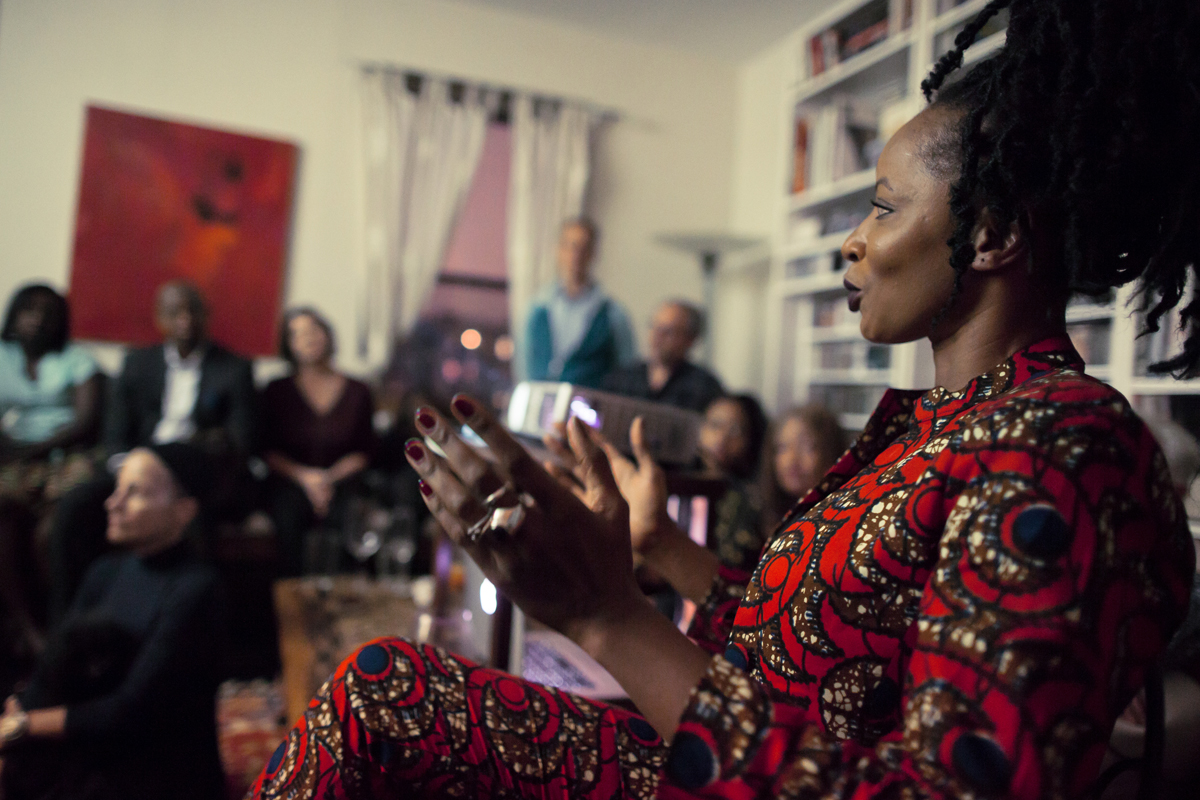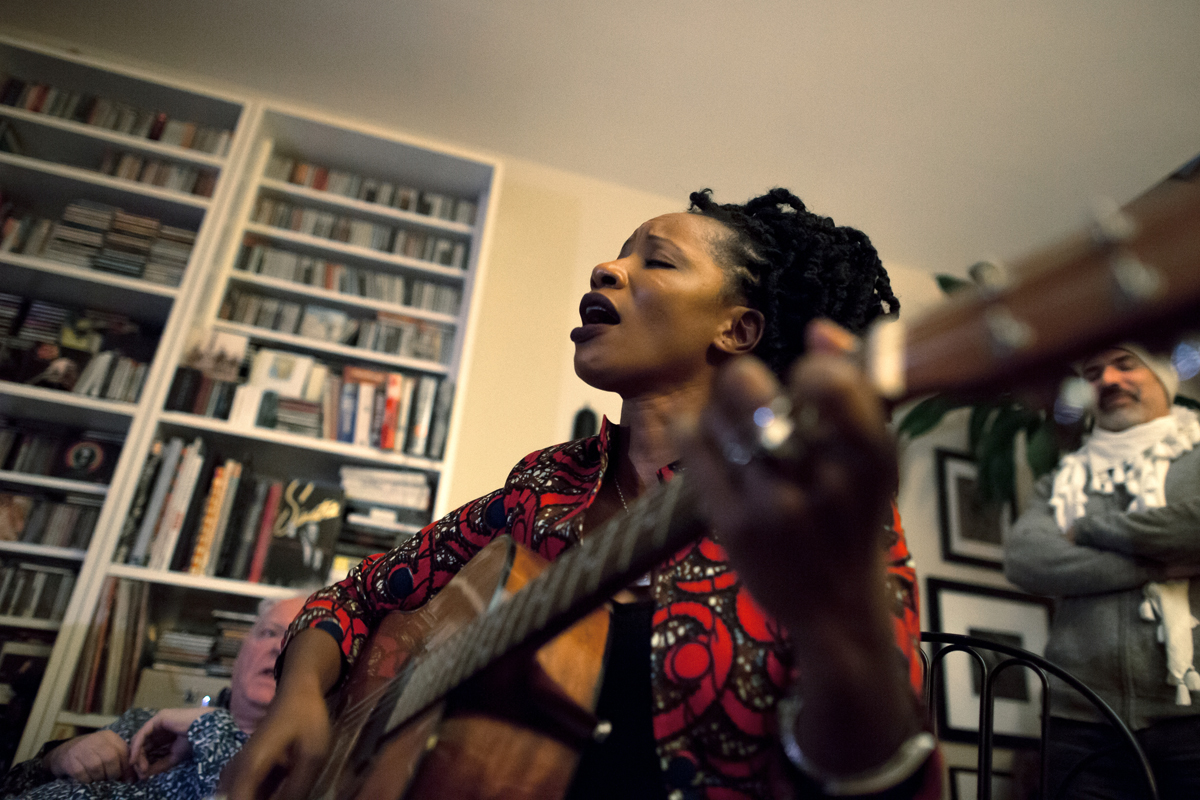An Ideal Black Girl returns with “Dimedi.”
It took a bird chirping outside her window in the bright, morning light to bring singer Natu Camara back to music. It was 2013 and the West African singer — once a rising star in her homeland of Guinea — found herself in New York City, mourning the death of her husband; her grief compounded by the disorientation of being suddenly alone and speaking only French. Awakened by the intrusion, she engaged the bird in conversation.
“I started singing when the bird is here, when the bird is here, what is the message?”, Camara explains. From the noisy bird she finally grasped what friends had been trying to tell her, a moment she recalls in the lyrics of her song “Khony”: “I knew it was time to go, so I stepped to my feet, no need for shoes, I started to fly, flew like a bird”
Link to YouTube video “Arabama Di”
Shaken out of her period of mourning, Natu was finally able to pick up her guitar, a gift from her late husband, and went back to making music full time. “I went back to my jobs and quit,” she says. Four years passed, she had over 30 songs written when she met Malian superstar Salif Keita, who was in town performing two at SOB’s. A recording session with Keita’s musicians in Brooklyn ensued, followed by a longer session in Bamako, and the result is Dimedi — Camara’s brand new solo album, set for release in Spring 2019.
“As an artist there are moments in life where you say “where am i? What am i doing? what happened to the Nat i knew?”
February 23rd, Natu premiered the video for her song "Arabama Di" at a Harlem viewing party. It was filmed in the rice paddies of Tayaki and streets of Conakry by Abeeba multimedia. This spring she will introduce the music to American audiences. Most of the songs speak about children, women’s rights, human rights are written from her experiences.
“Dimedi” produced by Natu Camara, Djessou and Abou arranged by Natu Camara. Dimedi album cover photo: Jamie Ambler
Dimedi was recorded in a few weeks at Studio Moffou in Bamako — with members of Salif Keita and Rokia Traore’s bands — but the album was a long time in the making. “A friend of mine with a studio in Brooklyn proposed to record two songs [“Gonlein” and “Nnakhounde”], if could pay the band,” Natu explains. “Salif Keita’s musicians agreed to come. After some time Salif himself showed up and clearly loved the music.”
A short time later she received a call from Keita’s guitarist Djessou. “Listen sister,” he said, I think you have a lot to give to this world, but New York is super expensive — why don’t you come to Mali and record your album?” A month later, she was in Bamako recording Dimedi. The result is 13 songs that once heard are hard to get out of your head.
The sessions left a big impression on Camara. “The musicians are so disciplined, and they love music,” she says. “It’s not easy to find. [They] dedicated all their time coming in the morning and leaving whenever we were done. Sometimes we would in the studio stay all night. They would say don’t you get tired. It’s unbelievable that a girl can be like this; they were so impressed, and not used to women taking control like this.”
Amit Peled and Natu Camara performing a few songs from “Dimedi” at the video preview party
It wasn’t the first time Natu surpassed expectations in her musical career. As a teenager , She and three high school friends formed Ideal Black Girls — the first all female rap group in West Africa. Forming a rap group at that time was about as far as one could go from the expectations that Guinea’s conservative culture held for girls. Ideal Black Girls overcame all obstacles to have a huge impact as pop artists and role models. They recorded two albums and toured West Africa to great acclaim.
The Ideal Black Girls (L-R) Hadjy, Missbah, Dine, Natu. Formed in 1997, they were the first all female rap group in West Africa. Photo courtesy of the artist
Natu says “we stood for women’s rights, girl’s rights, girls respect, some would say we were extremely feminist. In everything we would do we wanted to have more women than men. We created the only all woman’s festival, Rapsodie, in 2004, with a second edition in 2005. We hired only girls, I trained 24 girls. On our tours everywhere we went we didn’t see girls, we figured there were girls but they didn’t get help, so we invited girls from Senegal, Sierra Leone, Burkina Faso, Ivory Coast.”
Dimedi meets life with a song; Natu wraps her experiences and observations on life in Africa and New York in the exquisite melodies and cosmopolitan rhythms of contemporary West Africa. Most of the songs on the album speak about children, women’s rights, human rights, and are written directly from Natu’s experiences.
Natu and Guinean kids. Projected photo by Jamie Ambler
The title track, “Dimedi”, Sung in the Soussou and Fulani dialects, the song recalls sitting in the moonlight telling fairy tales. It’s a striking, slow tempo track that reaches back into memories of her childhood, with kora, guitar, upright bass, and piano prominent in the hypnotic arrangement. “My grandmother was in a small tiny village. a lot of my behavior came from there. The whole village was leaning on her, that was a big deal, so inspirational to me.”
🇬🇳N'oubliez pas de vous Abonner pour voir mes nouveautés. -Don't forget to subscribe to my Channel for more viodeos. Dédié à ma grand-mère et tous les enfants du monde. Dedicated to my grand-mother and to all the children in the world.
“In ‘Arabama Di’ I speak about the problems in my country — the dirty streets, roads with too much traffic, kids selling things on their head in the streets instead of going to school. Instead of attacking the government, I dictated the problems and how we’re gonna fix it.” In the video Natu strides through the streets joined by more and more bystanders moving forward as one. “ ‘Arabama Di’, in general is speaking to the government and the population, saying: ‘If you don’t take care of the country no one will’.”
Amit Peled and Natu Camara performing a few songs from “Dimedi” at the video preview party
“ ‘Yigui’ talks about your trusted person, this is an homage to my group Ideal Black Girls’, Natu continues. “They are the only ones who know me in and out… No matter what the situation they are my partners in crime. I talk about where we came from and where we are going. Wherever you are, they are right there next to you — thinking about each other wherever you are, no matter the distance, I still love you. I will always be next to you.”
Natu Camara talking about her music at a Harlem viewing party, February 23rd








